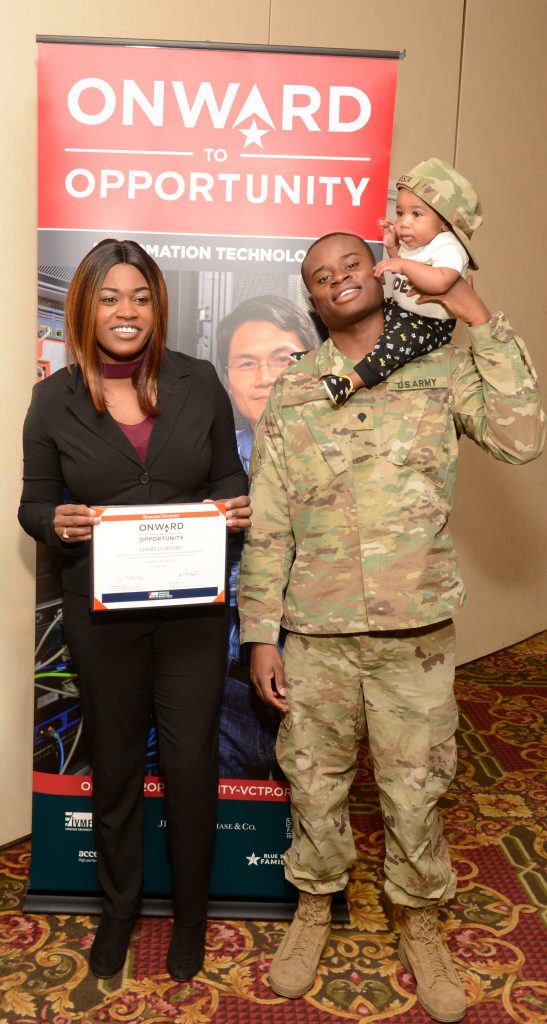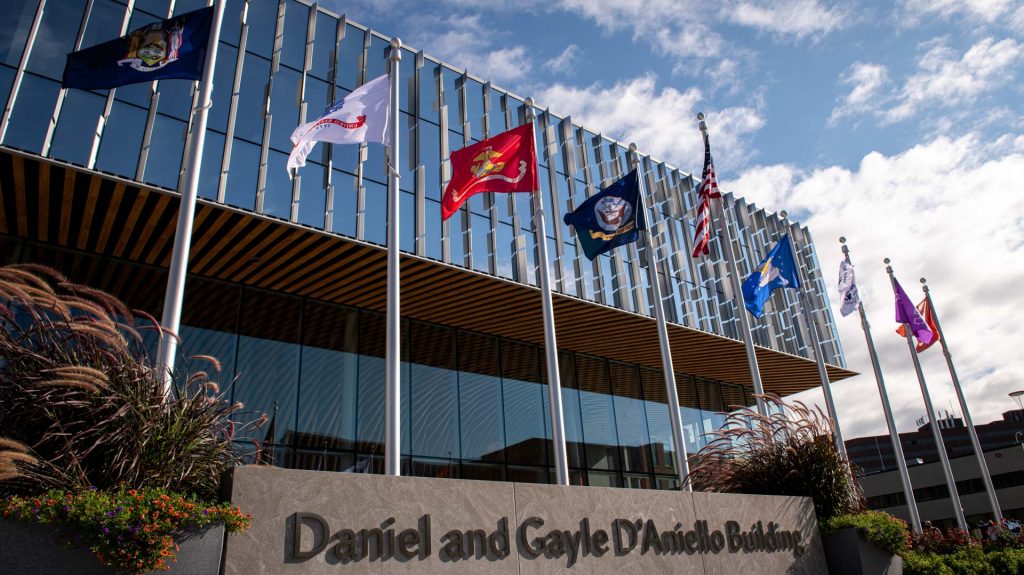In the post COVID-19 pandemic world, working from home is no longer a unique or awkward concept. Some organizations and businesses around the world struggled to adapt to the new business model, and others have started rolling back those remote worker policies as they pull their workforce back into the office environment. For the D’Aniello Institute for Veterans and Military Families (IVMF), operating with remote employees scattered across multiple time zones was already a normal part of the business day.
It may not seem like a huge deal to overcome, but when the bulk of your work force is starting the day at 8:30 in the morning on the East Coast, and other team members are still in bed at 4:30 in the morning on the West Coast, coordinating can get a little tricky. That’s where a particular component of the IVMF’s workforce comes into play–it’s veterans and military-connected staff.
The IVMF employs just over 100 people across a wide variety of roles from program managers, researchers, information technology specialists, communications specialists, administrators, as well as the managers and leadership. Like most Veteran Service Organizations (VSOs), the IVMF employs a substantial number from the military-connected community, nearly 60% of the workforce is made up of veterans, military spouses, and even currently serving members of the National Guard and reserve components of the military. One attribute these military-connected employees bring to the table is the ability to effectively network.
 In the military you’re forced to establish connections with people in other units, or even on other bases, to accomplish even some of the most basic of tasks. Not a single person or unit can do it all, so you must reach out to people, most of whom you’ve never met before, to coordinate everything from logistics to administration. For example, the simple task of moving an infantry company from their barracks to the field requires coordination to secure trucks for moving the people and equipment, the operations section to secure a training area, medical personnel for potential training mishaps, the chow hall to arrange for food, the supply section to secure ammo, the list goes on and on.
In the military you’re forced to establish connections with people in other units, or even on other bases, to accomplish even some of the most basic of tasks. Not a single person or unit can do it all, so you must reach out to people, most of whom you’ve never met before, to coordinate everything from logistics to administration. For example, the simple task of moving an infantry company from their barracks to the field requires coordination to secure trucks for moving the people and equipment, the operations section to secure a training area, medical personnel for potential training mishaps, the chow hall to arrange for food, the supply section to secure ammo, the list goes on and on.
Networking outside of the military looks a little different, but veterans have a shared connection that can instantly transcend the amount of time it may otherwise take to form a working relationship. When a common goal is established, veterans can quickly come together to accomplish incredible things, especially when the mission is supporting fellow veterans and their families.
Upwards of 60% of jobs are filled through networking, so if you aren’t putting yourself out there to establish these connections that transition into your next career can be far, far more difficult. It doesn’t matter if you’re trying to land that first job, make a leap into a higher paying position, or even advance your organization’s initiatives through strategic partnerships, a veteran’s networking ability can have a profound impact on their success after service. It’s one thing to talk about how important networking can be, but for many veterans the idea of walking into a room full of strangers and engaging in random conversations doesn’t sound appealing. Many servicemembers just can not imagine what they may have in common with someone who is unfamiliar with the military. To help, here are a few tips to ensuring your getting off on the right foot with building your network.
- First and foremost, realize it’s necessary.
I landed my first position with the IVMF after establishing a connection with another veteran in the organization who happened to be a Blackhawk pilot like I was. Those two details made it easier for us to build a connection quickly, so when a position in my region became available that network connection made it possible for me to not only apply for the position, but also gain valuable insight into the organization that would help during the interview process. It’s easy to dismiss networking as unnecessary because it makes you uncomfortable, or to rationalize why it’s not worth your time to go to that local networking event. The truth of the matter is if you’re having a hard time getting traction in the professional environment after your military service, it may be time to focus on developing those professional relationships.
- Focus on what they’re doing and how you can help.
One of the fastest ways to establish a professional connection with someone is to help them out of a jam. Maybe you have particular knowledge of a system or process, or you have a unique skillset that a company needs. If you don’t take the time to figure out what the other person needs then you may never get the opportunity to take advantage of what that person has to offer. Even if the only thing you can provide is the name of someone else you know who may be more apt to help, people are more prone to remember you if you’ve helped them succeed.
- Do Your Homework Before Entering the Room
You can go to a networking event and shake every hand in the room, make eye contact, engage in small talk, and exchange business cards. Chances are you’re going to forget almost everyone you meet and they’re probably going to forget you too. Instead, look at the list of people who will be attending, or at least the list of organizations that will be there. Find the three or four people who make sense for you to speak with and make sure you do not leave the room until you’ve met them, spent some quality time speaking to them about their organization, and don’t leave until you’ve committed to following up.
- Follow Up!
It can be a message on LinkedIn, an e-mail, or a telephone call, but be sure to reach out to that newfound connection. Establishing a connection can be easy, but maintaining it and cultivating a professional relationship with someone takes time. Eventually, try to meet that person somewhere out of the office environment for coffee or a quick lunch, it doesn’t have to be something fancy–it truly is the effort to just reach out and stay connected that counts.
- Ask For Help
This can be a big barrier for veterans, when you’re asking for help you’re putting yourself in a vulnerable position. The idea of being vulnerable probably sounds counter intuitive to how you got along in the military, but at some point you need that network to work out for you as well. It can be as simple as requesting an introduction to someone they know, to getting them on board for a long-term partnership between your organizations. There has to be give and take in a relationship, and if you’re only coming to the rescue for everyone else you’re eventually going to burn out.
There are a plethora of resources for veterans to utilize when establishing or growing their own professional network, especially if you find yourself in a new environment after getting out of the military. Check with your local chamber of commerce for veteran-specific events, be sure your online presence is up to date and accessible to recruiters and hiring managers, or reach out to some of the veterans you know who separated the military a year or so before you. At the end of the day, your network will be the most crucial tool to ensure your professional success after your military service. If you neglect the process and fail to establish even the most basic of introductory connections, prepare for an uphill struggle when you need to just get your foot in the door.
With that all said, even with networking, even with a properly branded self-image, still the number one reason why so many people are unsuccessful in landing interviews from an application is they simply don’t tailor their resume to the job description. A job description should be viewed as a problem statement form the company… you are selling yourself as a solution to their problem. If a job description is asking for someone who has a vast understanding of Microsoft Office, then your resume needs to address that! Do not assume that just because you have a bullet on your resume that says you managed a budget of 5 million dollars that that somehow means you can learn Microsoft Office. Tailor your resume and you will be pleasantly surprised how many interviews you will find yourself navigating.
About The Author: Ben Dufay is the Senior Program Manager of Onward to Opportunity.
Ben is a veteran of both the U.S. Army and Navy, retiring as an Army Chief Warrant Officer Three. He served as a Fleet Marine Force Corpsman in the Navy before commissioning as an Aviation Warrant Officer in the U.S. Army. Ben completed deployments to Iraq, Afghanistan and Egypt. He served a collective 17 years and received numerous medals and distinctions including the Senior Aviator Badge, the Meritorious Service Medal and the Air Medal, among others.
Ben holds a master’s degree in organizational leadership from Brandman University.


